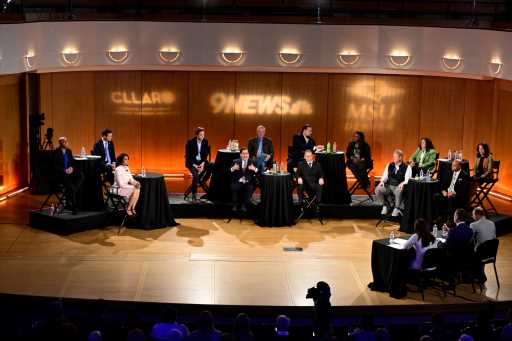In the first Denver election to feature taxpayer funding for candidates, the city’s Fair Election Fund matched campaign contributions from 19,243 city voters and now authorized more than $7.1 million in payments to candidates.
The Denver Elections Divison on Tuesday was set to authorize its final pre-Election Day disbursement of money from the city’s $8 million Fair Elections Fund pot. The latest $1.8 million round of payments, covering qualifying campaign contributions made during the month of February, is the largest total the fund paid out during the 2023 municipal election cycle.
Participation in the Fair Elections Fund was voluntary for candidates running for city offices. Those who signed on agreed to abide by lower contribution limits — $500 compared to $1,000 for mayoral candidates, $350 vs. $700 for at-large council seats and $200 vs $400 for district-level council seats — in return for public matches on donations between $5 and $50. The 9-to-1 ratio turned a $50 donation into $500 dollars with taxpayer money.
The final tallies before the April 4 election provide a picture of local support for candidates with voting already underway.
Here is a breakdown of how much each participating mayoral candidate received from the fund:
•Kelly Brough got $750,000, matching contributions from 1,736 people.
• Mike Johnston got $613,539, matching contributions from 1,478 people.
• Leslie Herod got $587,057, matching contributions from 1,612 people.
• Chris Hansen got $375,187, matching contributions from 933 people.
• Debbie Ortega got $249,705, matching contributions from 660 people.
• Lisa Calderón got $195,351, matching contributions from 571 people.
• Kwame Spearman got $188,406, matching contributions from 572 people.
• Ean Thomas Tafoya got $153,713, matching contributions from 515 people.
• Trinidad Rodriguez got $120,243, matching contributions from 365 people.
• Thomas Wolf got $105,329, matching contributions from 316 people.
• Terrance Roberts got $73,908, matching contributions from 308 people.
• Jim Walsh got $51,219, matching contributions from 306 people.
• Aurelio Martinez got $37,259, matching contributions from 263 people.
Brough is the only candidate that hit the $750,000 cap set for mayoral campaigns, something her campaign views as and endorsement of her in its own right.
The single biggest month for matching funds was Johnston’s February, in which he received enough qualifying donations to trigger a $360,504 payment from the fund, more than half of his total collections. Johnston got started a month later than Brough who collected her first FEF payment in November.
Those final totals will have bearing on the runoff stage of the election assuming no mayoral candidate gets more than 50% of all votes leading up to April 4 and the race has to be decided on June 6.
Fair Elections Fund candidates get one more payout if they are one of the two candidates who make the runoff. That payment is a lump sum equaling 25% of their total payment in the first round, according to the elections division. That would mean Brough would get $187,500 on the high end and Martinez would get $9,314 on the low end should either be one of the two candidates that makes it to the next round.
The Fair Elections Fund was born of a 2018 ballot measure that reformed campaign finance in Denver by banning direct corporate donations to candidates and setting lower total contribution limits. But the reform does not mean outside money cannot influence the race through independent expenditure committees.
Those committees cannot coordinate with the campaigns they are supporting but are also not subject to donation limits. Johnston has by far the largest independent expenditure committee backing him with more than $1.4 million in spending to date. The committee backing Brough is second with just shy of $905,000 in spending. No other candidate’s independent expenditure committee has spent more than $170,000 yet, according to Denver campaign finance records available Tuesday afternoon.
The Fair Elections Fund started with an $8 million budget which included the money needed to administer the program. It is expected to make it through the 2023 election without being tapped out.
Stay up-to-date with Colorado Politics by signing up for our weekly newsletter, The Spot.
Source: Read Full Article
